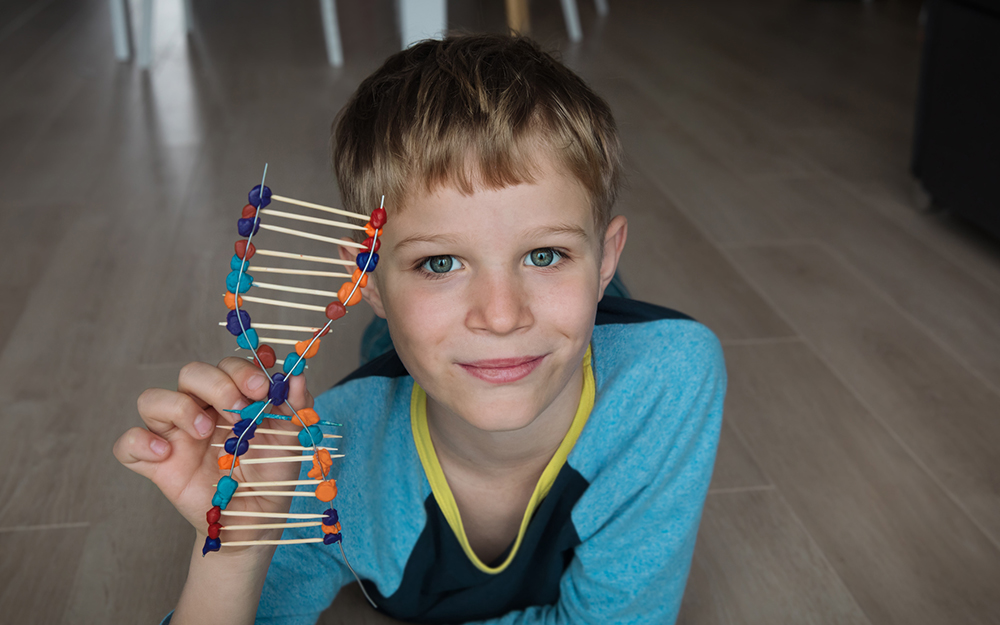Do Children Need Genetic Testing?
Date
August 15, 2023

Date
August 15, 2023
Credits
Medical providers featured in this article

In Brief
{{cta-block}}
Genes not only dictate the color of your child’s eyes, hair and skin—and their athletic prowess—but they also contain all of the instructions that create life. Pediatric medical genetics is a specialty that focuses on uncovering inherited conditions in children of all ages, and it includes genetic testing.
"The nice thing about pediatric geneticists is that we wear different hats," said Pedro Sanchez, MD, director of pediatric medical genetics at Cedars-Sinai Guerin Children’s. "We wear our pediatrician hat when we’re evaluating children to determine if they fall on the spectrum of 'normal,' but we can also put on our medical geneticist hat when there’s a question about whether a child has inherited a specific genetic mutation."
{{providers}}
"This area is rapidly evolving. We’re gaining new insights every day, and I get to call parents, sometimes years later, and tell them we have new information that may help their children."
Pediatric Genetics Explained
Each person has a unique genetic code, which includes two copies of every gene—one from each parent. These genetic variations can be harmful, helpful or neutral.
"Genetic testing can be very simple. For example, testing for an extra chromosome, as in Down syndrome," Sanchez said. "But it can also be extremely complicated, where we don’t have a straightforward approach to uncover a specific genetic variation."
Some conditions may not be genetic at all, or they arise from the intersection of environment and genetics.
Fortunately, most children are born healthy without any genetic anomalies. But for the children who have inherited differences that affect their health and wellbeing, pinpointing a genetic reason behind their experiences can be life-changing.
"Working with a medical geneticist or genetic counselor can help you uncover whether your child has inherited genetic mutations that result in physical differences, developmental delays, medical conditions or even behavior problems," Sanchez said.
Candidates for Pediatric Genetic Testing
A pediatric geneticist is trained to identify the causes and trajectory of inherited conditions. These highly skilled specialists can help families understand inherited genetic conditions and also guide them to appropriate treatments. Testing can also inform family members who are at risk of conceiving a child with the same inherited disorder.
Every situation is unique. Some families are wondering if their child shows signs of a genetic issue, or whether their concerns fall on the spectrum of "normal." Others are exploring whether their child is affected by a certain genetic condition that run in the family. In each case, identifying children who have genetic differences can lead to early intervention and improved outcomes.
"We start with a family history and physical exam and then consider the types of tests that are available to identify specific genetic conditions," Sanchez said.
Tests range from a simple saliva test, which requires only a cheek swab, to whole genome testing, which requires blood samples from both parents and the child.
The key question is whether testing will provide actionable information for families in the form of effective treatment options or in finding community. In many cases, knowing a genetic condition is at play can help families connect with the appropriate resources and supports.
"My approach is always to identify the right test for the right patient at the right time," Sanchez said.
Finding Community
Sanchez has personal experience with inherited genetic differences. When his son was only 6 months old, he learned that his child had severe hemophilia A, a bleeding disorder wherein the blood doesn’t properly clot.
"Genetic conditions don’t discriminate," Sanchez said. "They affect everyone. As a parent, you’re looking for hope, resources and potential treatments."
Sanchez strives to meet families where they are. "Our team can act as a supportive resource for kids who might need a special network," Sanchez said. "We not only coordinate care with a multidisciplinary team of experts to support their children, but we also connect newly diagnosed patients with families who have lived experience and might be able to provide additional resources and advice."
It’s also important for families to realize that a negative test does not necessarily mean that the child has not inherited a genetic difference. Sanchez encourages families with a negative or a positive result to check back in a year or two to reanalyze data and/or run new tests.
"This area is rapidly evolving," Sanchez said. "We’re gaining new insights every day, and I get to call parents, sometimes years later, and tell them we have new information that may help their children."




